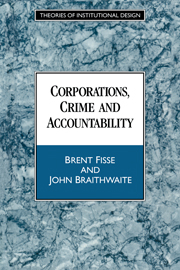Book contents
- Frontmatter
- Contents
- Preface
- Abbreviations
- 1 Crime, Responsibility and Corporate Society
- 2 Individualism
- 3 Enterprise Liability
- 4 Organisation Theory Perspectives
- 5 Making the Buck Stop
- 6 Assessing the Accountability Model
- 7 The Possibility of Responsibility for Corporate Crime
- Bibliography of Cited Works
- Index
3 - Enterprise Liability
Published online by Cambridge University Press: 11 March 2010
- Frontmatter
- Contents
- Preface
- Abbreviations
- 1 Crime, Responsibility and Corporate Society
- 2 Individualism
- 3 Enterprise Liability
- 4 Organisation Theory Perspectives
- 5 Making the Buck Stop
- 6 Assessing the Accountability Model
- 7 The Possibility of Responsibility for Corporate Crime
- Bibliography of Cited Works
- Index
Summary
Enterprise Liability and Economic Analysis of Law
Individualism contrasts sharply with enterprise liability, which is the strategy of relying primarily or even exclusively on corporate liability. Enterprise liability is supported by a number of economically oriented studies of individual and corporate liability for offences, monetary penalties, and regulatory taxes. Economic analysis has become a major current in legal thinking, especially in North America, and has been influential in many areas of corporate regulation. This is readily understandable given that an economic regime of controls holds the promise of low cost and a limited degree of government intervention. The purpose of this chapter is to review the major contributions that are relevant to our inquiry, and to examine the extent to which they help to resolve the problems identified in Chapter 1.
Five major contributions in the literature are taken as the basis of discussion. The first is the pioneering, although now somewhat dated, analysis of monetary penalties by Kenneth Elzinga and William Breit in 1976. Second, there is Reinier Kraakman's leading article, ‘Corporate Liability Strategies and the Costs of Legal Controls’, published in 1984. The third is Christopher Stone's earlier study, ‘The Place of Enterprise Liability in the Control of Corporate Conduct’. Fourth is the influential report of the Pearce Commission on environmental protection; this is an exemplar of the control of corporate harm-causing by taxes on outputs of harm. Finally, we consider the recent paper by Mitchell Polinsky and Steven Shavell, ‘Should Employees be Subject to Fines and Imprisonment Given the Existence of Corporate Liability?’
- Type
- Chapter
- Information
- Corporations, Crime and Accountability , pp. 59 - 100Publisher: Cambridge University PressPrint publication year: 1994

